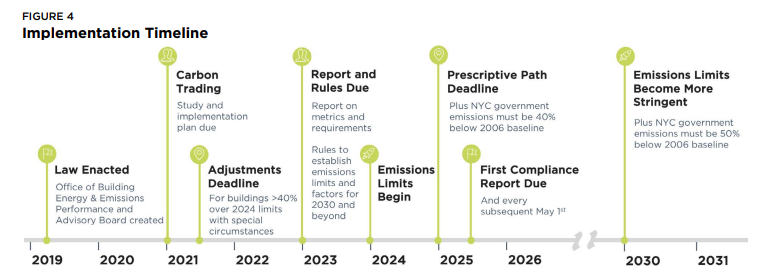Complying with NYC LL97—Reduction of Greenhouse Gas (GHG) Emissions for Certain Buildings in NYC
The City of New York enacted Local Law 97 (LL97) in 2019 as a part of the Climate Mobilization Act to reduce carbon emissions from buildings. These carbon capping standards are applicable from 2024 onward and will become more stringent over time, with a goal to reduce emissions by 80 percent by the year 2050.
On October 6, NYCDOB released a proposed rule outlining the procedure for reporting and complying with GHG emissions for buildings covered under LL97. Public comments on this proposed rule will be accepted until 11/14/2022, when a public hearing will be virtually held. Walden’s air permitting experts will attend the public hearing, and we will post a follow-up blog with important updates.
Applicability
Currently LL97 applies to the following buildings:
-
- Buildings that exceed 25,000 gross square feet
- Two or more buildings on the same tax lot that together exceed 50,000 gross square feet
- Two or more buildings held in the condominium form of ownership that are governed by the same board of managers and that together exceed 50,000 gross square feet
There are a few exemptions from LL97 requirements listed in the NYC codes under Article 320 (“Building energy and emissions limits”) and Article 321 (“Energy conservation measure requirements for certain buildings”). These exemptions include:
-
- A housing development/building owned by the NYC housing authority
- A rent regulated accommodation
- A building whose main occupant is a New York City zoning group A-3 religious house of worship
- Real property owned by a housing development fund company
- A building that participates in a project-based federal housing program
If your property is subject to the NYC Benchmarking Law (requiring annual energy and water use reporting), it is subject to the building emissions law.
What should covered buildings do? Start planning today.
Compliance begins in 2024, the first tranche of emission standards must be achieved during the period 2024-2029, the second tranche is for the years 2030-2034, and the third tranche is for the years 2035-2050 (see timeline below). With each successive tranche, individual buildings are required to make facility and operational changes that will decrease the building’s energy use and carbon footprint.

Source: “Urban Green Council—NYC Building Emissions Law Summary”
Buildings are required to implement energy management strategies, so the time to plan is now. Substantial cost may be required to make extensive energy-saving modifications and implement ongoing energy management initiatives, so thoughtful planning is recommended.
Many financial incentives and guidance can be obtained from NYSERDA and your utility company to aid with LL97 compliance. NYSERDA offers support through every step of your building upgrades, from planning improvements to installation, to monitoring performance.
The 80×50 Buildings Partnership (a collaboration between NYC’s leading building and energy stakeholders to develop smart climate change policies) offers recommendations for more feasible timelines, a green power purchase option, a provision for carbon trading between buildings, and future refinement through an advisory board process.
Technical amendments to the law
After passing LL97, the New York City Council passed technical amendments to this law under Local Law 147 of 2019 and Local Law 95 of 2020. Over time, changes were made to the law to clarify that the Department of Buildings can:
-
- Revise the 2030 standards by rule
- Apply changes regarding using a different metric and calculating carbon emissions from electricity as per the time of use
- Revise credits for GHG offsets and energy storage extension to later compliance periods
Also, previously exempt affordable housing must now comply with the prescriptive package of low-cost energy savings measures.
How will compliance with LL97 benefit your building?
Long-term energy management strategies and installation of energy-saving solutions will be beneficial to your business, your properties, and your tenants. Energy savings can reduce turnover by improving comfort and keeping rents affordable. You may see an improvement in your bottom line with lower operating expenses. The changes you make will reduce your carbon footprint, which means that you will be contributing to a greener, cleaner, and healthier community. Accreditation from green building standards will also increase the value and marketability of your properties by lowering overall operational costs.
Walden is collaborating with companies like New York Energy and Environmental to ensure that all of your energy saving needs are met. We are available to help building owners comply with LL97 by identifying, designing, and implementing energy conservation measures through our energy auditing services. Please contact us at 516-559-6976 with any questions about LL97 applicability and all specific requirements contained therein, or to discuss how to get started with an energy audit.

Read more about the services offered by Walden’s air experts here, and feel free to contact us at 516-559-6976 if you have any questions about LL97.
